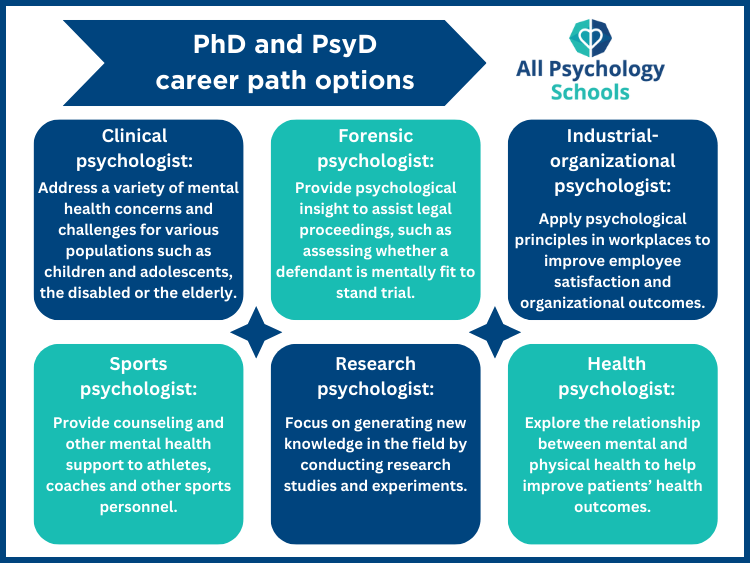PhD vs. PsyD: What’s the Difference?

If your goal is to become a fully licensed psychologist, researcher, or professor, there are several degrees that can help you on the path toward your career.
In particular, there are 2 primary doctoral-level options that can qualify you to work at the highest level of the field–the Doctor of Philosophy (PhD) and the Doctor of Psychology (PsyD) degrees.
There are, however, other less common degrees that can train you to work in psychology in a highly specialized way, and you can read more about those options later on.
The difference between a PhD and a PsyD
The main difference between a PsyD and a PhD in Clinical Psychology is their emphasis and training. A PsyD, or Doctor of Psychology, is a professional doctorate that focuses on practical skills and clinical training. It prepares graduates for direct patient care. On the other hand, a PhD in Clinical Psychology is a research-oriented doctorate that emphasizes theoretical knowledge and contributes to the advancement of the field through research.
While both degrees qualify individuals for clinical practice and therapy, the choice between a PsyD and a PhD depends on career goals and preferences. Those seeking a strong clinical focus may opt for a PsyD, while those interested in research and academia may choose a PhD. Read on to learn more about the similarities and differences and how they can impact your career.
What Is a PhD in Psychology?
Of the 2 main psychology degrees, the more common is the PhD. According to the American Psychological Association (APA), PhDs are “intended for students interested in generating new knowledge through scientific research (i.e., setting up experiments, collecting data, applying statistical and analytical techniques) and/or gaining teaching experience.”
What Is a PsyD?
The Doctor of Psychology degree was introduced in the 1970s as an alternative for students who were less interested in conducting ongoing psychological research and more interested in providing psychological services to patients and the public. Per the APA, “the focus of PsyD programs is to train students to engage in careers that apply scientific knowledge of psychology and deliver empirically based service to individual, groups, and organizations.”
Other similarities and differences
On top of the focus of each degree, there are other differences to consider as well. There are also several similarities. The chart below outlines these factors, and you can find more detailed information further down.
| PhD | PsyD |
| Admission requirements: Master’s (possibly bachelor’s), high GPA, good scores on the GRE or other tests, essays, interviews, and letters of recommendation | Admission requirements: Master’s (possibly bachelor’s), high GPA, good scores on the GRE or other tests, essays, interviews, and letters of recommendation |
| Average acceptance rate: 10–15% | Average acceptance rate: Roughly 40% |
| Program length: Usually 5–8 years | Program length: Usually 4–6 years |
| Courses and training: Research, statistics, and teaching methodologies. At least a 1-year APA-accredited internship is also required. | Courses and training: Applying knowledge directly to psychology practice with individuals and groups. An APA-accredited internship is also required. |
| Doctoral project: Dissertation | Doctoral project: Possible dissertation or equivalent project |
| Funding: Waived tuition and stipends in exchange for teaching or research assistance | Funding: Tuition coverage not common, but possible stipends through assistantship |
| Licensing and certification: State licensing required, certification optional | Licensing and certification: State licensing required, certification optional |
| Career options: Often research lab and teaching positions, as well as applied practical roles | Career options: Direct client care in positions like counseling, social work, human services, and consulting |
Admission requirements
The processes of applying to PhD and PsyD programs is very similar. You’re likely to need a master’s degree in psychology or a related field, though it’s possible to find combined masters/doctoral programs that accept students who only have a bachelor’s degree.
You’re also likely to need a GPA of at least a 3.0 and certain scores on the GRE or another school-administered test. You’ll also be expected to write personal essays, undergo interviews, and submit letters of recommendation.
Acceptance rates
The most significant difference in the admission process is the average acceptance rates of PhD and PsyD programs. Because there are far more PhD programs in psychology available, they tend to be highly selective, with many only accepting 10 students or fewer a year. Across the country, this works out to an average acceptance rate of about 13 percent of applicants.
While this varies by school, PsyD programs tend to accommodate a higher number of students per year, sometimes as many as 100. This, coupled with the fact that there are fewer students applying to these programs in general, makes for an average acceptance rate of about 40 percent.
Of course, PsyD programs are not necessarily easier to get into. Though they often accept more students than PhDs, there are far fewer PsyD programs as a whole. This means the available number of PsyD spots across the country could be the same or even less than those for PhD programs.
Program length
For most students, PsyD programs take roughly 4–6 years to complete. Due to the stronger emphasis on extensive research, PhD programs typically take between 5 and 8 years.
Courses and training
The training you receive in a PhD program will focus on research that leads you to producing new scientific knowledge. PsyD programs emphasize training that allows you to apply your knowledge in a practical setting, though you’ll likely still conduct some research.
In both programs, you’ll be required to participate in an internship for at least a year. As with your program itself, these internships should be accredited by the APA. Choosing a program or internship that’s not accredited could make it difficult to get your license.
Doctoral project
In a PhD program, you’re required to complete and defend a dissertation. Many PsyD programs also require a dissertation or equivalent doctoral project, likely designed to demonstrate different skills than research-driven PhD dissertations.
Funding
Financial aid can be an incredibly important part of selecting the program and school you attend. Most PhD programs waive a student’s tuition and provide a stipend for assisting with research or teaching. While you’ll likely be in school for a longer period of time, you may be able to graduate without any debt.
This typically isn’t the case for PsyD programs, however you may be able to find schools that provide stipends for assistantships. Graduates of PsyD programs are more likely to leave with student debt, though the potential to graduate in less time means you can find work and start earning a salary earlier.
Licensing and certification
Whether you hold a PhD or PsyD, to officially call yourself a psychologist, you need to be licensed in the state where you work. Requirements vary slightly by location, but you’ll have to pass the Examination for Professional Practice in Psychology (EPPP).
According to the Association of State and Provincial Psychology Boards (ASPPB), the exam consists of 225 multiple-choice questions. Though state licensing boards differ on what they consider passing, the ASPPB recommends a score of at least 500 out of 800 to allow you to practice psychology independently.
Becoming certified isn’t required to work as a psychologist, though you may want to seek out board certification to support that you have the proper knowledge in your chosen subfield. Certification may also earn you better job opportunities and potential financial benefits. These credentials can be gained through the American Board of Professional Psychology.
Career options
Those with PhD and PsyD degrees can pursue many of the same career opportunities. They may become:
- Clinical psychologists
- Forensic psychologists
- Mental health psychologists
- Organizational psychologists
- Sports psychologists
The biggest difference in jobs is in the world of academia. If you wish to pursue a position that involves research or teaching, a PhD will better prepare you for those roles. If you know you only want to apply your psychology training in a more client-facing way, a PsyD can provide you with advanced knowledge in that area.

Other Doctoral Degrees in Psychology
A third degree option is a Doctor of Education (EdD) in Psychology, though this is far less common. Those who pursue these degrees typically do so to apply their training to educational and developmental fields. This can often mean working in school psychology or in areas of special education. These degrees could also be applied to the field of educational psychology, which studies how students learn and what keeps them motivated in order to develop curriculum and technology.
Another less common degree is the Doctor of Business Administration (DBA) in Industrial and Organizational Psychology. These degrees are designed specifically for students who want to pursue high-level roles within business organizations. Training involves teaching the assessment of employee behavior in order to implement policies and procedures that help a company meet its goal while maintaining employee relations and proper conduct.
How to Choose Your Degree Program
Choosing which degree to pursue ultimately comes down to your career goals. But sometimes it can be hard to know what exactly you’ll want to do that many years in advance. The solution can come by applying to a variety of programs and using the interview process to determine the best fit. Ask questions such as:
- Is the program accredited by the APA?
- What’s the class size?
- What’s the graduation rate?
- How many students match with their preferred internship?
- What other projects or experiences are required?
- How well do students do on the EPPP?
- What types of positions have recent graduates gone on to have?
- What type of financial assistance is available?
